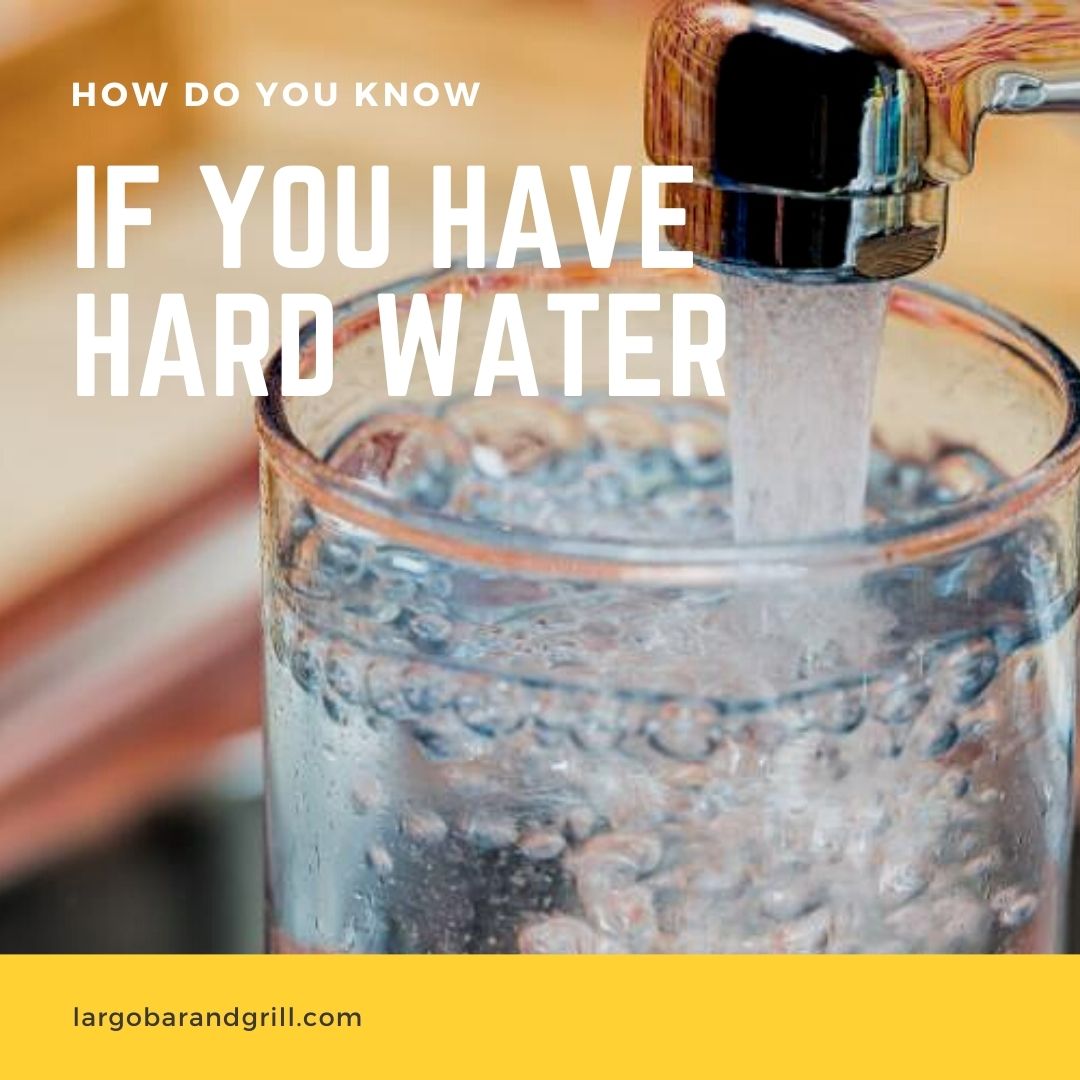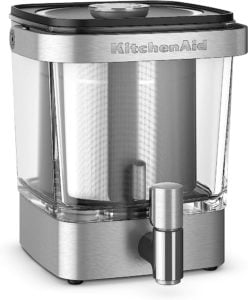Disclaimer: There are affiliate links in this post. At no cost to you, I get commissions for purchases made through links in this post.
If you’re not sure if you have hard water, there are a few ways to find out. One is to check the water hardness level in your area. Another way is to test your water yourself.
This blog post will show you how to do both. Hard water can cause problems such as scale buildup on appliances and pipes, reduced efficiency of appliances, and bad-tasting or -smelling water.
If you think you might have hard water, it’s important to act and treat it. Let’s look at how to determine if you have hard water and what you can do about it.
What’s hard water?
Hard water is a term used to describe water that has high mineral content. Minerals that impact the hardness of a water supply include calcium and magnesium from dissolved calcium carbonate and calcium sulfate, respectively. These chemicals naturally occur in groundwater systems but can also be found in surface waters because of weathering processes.
Hard water is typically considered “hard” because it leaves scum on surfaces where water stands, such as sinks, bathtubs, and showers. Hard water also can lead to soap curdling or build-up of limescale deposits. This is since hard water has chemicals that interfere with normal soap function, which is generally clean by attracting dirt and grease.
Hard Water and its potential health effects
Over time, hard water can lead to mineral deposits in household items such as dishwashers and washing machines. Scaling is a problem in pipes, so appliances that use water for heating or cooling will sometimes become damaged.
This damage could lead to increased utility costs for the consumer. Scale will also form in water heaters; this can restrict the flow of hot water and lead to a lack of heating. In addition, scale could release metals from the inside of the water heater which could leach into drinking water, so it is important to regularly flush your home’s hot-water heater.
In some cases, hard water can impact the taste of food and drink. Because it is difficult to remove minerals that dissolve in water, an ion exchange system is sometimes used to remove or reduce them.
Harsh chemicals like calcium, magnesium, iron, manganese, bicarbonate (i.e., baking soda) can exist in ground or surface waters at high concentrations.
These ions come from rocks and soil that dissolve into the water as it slowly seeps through or is channeled over them, a process called leaching. Water with many dissolved minerals is called “hard” because scale forms more easily on pipes with hard water, soap curdles in hard water, and hard water leaves unsightly stains on fixtures and laundry.
Water is considered to be “hard” when it has more than 120 milligrams per liter of dissolved calcium carbonate (CaCO3) (about 7 grains/gallon or 17.1 grams/liter).
Calcium and magnesium ions can also be found in groundwater as a result of dissolution of minerals such as gypsum and limestone. Dissolved bicarbonate (HCO3-) can leave a white or grayish-scale deposit on plumbing fixtures when it mixes with the byproducts of soap.
Iron, manganese, hydrogen sulfide, some pesticides, herbicides, toxic metals such as lead are sometimes found in groundwater sources at high concentrations.
Water that is considered “soft” has just a few dissolved minerals and usually no more than 40-50 milligrams per liter of dissolved minerals (about 3 grains/gallon or 7.7 grams/liter).
This includes water with no detectable levels of dissolved minerals like distilled water. Water that contains low concentrations of essential elements such as calcium and magnesium, but do not form scale in pipes is considered “soft,” even though some people classify this water as being hard.
Because high concentrations of dissolved salts can be corrosive to metals like iron, steel, copper, zinc and lead, the presence of these ions in water can cause problems like pitting corrosion (where localized corrosion eats away at the metal) and general corrosion (where the metal rusts or disintegrates everywhere). High concentrations of dissolved bicarbonate can leave a white or grayish-scale deposit on plumbing fixtures.
Health and taste problems
Hard water is not generally considered dangerous to your health. However, it can cause scale buildup inside of drinking water pipes and other household plumbing reducing the effectiveness of water treatment processes like carbon filters, chlorination and ultraviolet (UV) light. The presence of scale can reduce the amount of water that is available for use, whether it’s used to rinse dishes, flush toilets or do laundry. Scaling also reduces the efficiency of heating elements in clothes dryers, water heaters and dishwashers. High concentrations of some metals like aluminum, iron, magnesium and copper can cause taste problems for drinking water.
Diagnosis
If the test indicates that the water contains dissolved salts at high concentrations it is usually determined to be hard. The number of dissolved solids in water is expressed in milligrams per liter (mg/L) or parts per million (PPM).
Hardness as calcium carbonate
Calcium and magnesium ions, the primary contributors to hardness, exist as bicarbonates and sulfates in addition to carbonates. Carbonate hardness is determined by measuring the concentration of dissolved carbonate and bicarbonate ions in water.
Hardness as calcium carbonate equivalent
Some scientists estimate that when the total concentration of all forms of calcium has been determined, the amount present as carbonate can be assumed to be half or 50 percent of this total. This yields a hardness value which is about double that indicated by direct measurement of carbonate and bicarbonate. The term “total” or “normal” hardness is used to describe such waters.
Uses
Hard water is good for some things such as washing dishes, laundry and cleaning. It also adds minerals that are beneficial to health such as magnesium, which can help lower blood pressure along with calcium, which is vital to bone health. As mentioned before, hardness is an issue when it comes to appliances like dishwashers and water heaters because of scale buildup.
Hardness as magnesium sulfate
Magnesium sulfate (Epsom salt) can be used in hydroponic gardening with the help of special systems that are used to dissolve minerals. It is also mixed with bath water to relieve muscle aches and pains, soften the skin, and improve absorption of minerals through the skin.
A lack of magnesium in drinking water can lead to widespread problems such as poor bone health, low energy levels and heart problems. Some experts believe that the current popularity of bottled water is partly due to consumers seeking mineral-rich waters which they perceive as healthier.
Water with low levels of calcium and magnesium is referred to as “soft” water. However, not all soft waters are equally soft. Although most people use the term “soft water” to mean water that has a low total dissolved solid content, some water authorities (e.g., U.S. soft drink manufacturers) define “soft water” to mean water that has a low calcium content, regardless of the total dissolved solid content.
If your laundry comes out with clean clothes but without much lather, it is possible that you are using hard water in your home. When boiling water, clean water will form a hard angle while dirty water will create a film on top due to impurities.
Hardness as calcium sulfate
Sulfate-rich waters derived from deep wells in New York and Illinois have been used for centuries for therapeutic purposes. The original settlers of the Catskill Mountain region near New York City recognized the value of these waters and built resorts to exploit the healing powers reputedly afforded by bathing in and drinking water with high sulfate content. The popularity of sulfate-rich waters for therapeutic purposes waned when less expensive sources of sulfate (primarily from industrial waste) became available, but the acceptance of sulfates as a therapeutic substance did not completely disappear.
Hardness as sodium chloride
Salt-rich water is beneficial for the skin and helps to heal many problems such as psoriasis, eczema, rashes, blackheads, and acne. Salt water is highly buoyant which provides resistance for muscles, allowing them to get stronger when used regularly in a spa or pool. Salt-rich water is also an antiseptic, which helps to kill bacteria and purify skin.
FAQs about hard water
Hard water is so called because it contains a large quantity of dissolved minerals, such as calcium and magnesium ions. These minerals sink into the water during treatment at the waterworks so it comes out of your taps with high levels of dissolved solids.
Yes, it is perfectly safe. The minerals found in hard water are the same as those occurring naturally in foods like whole grains, leafy vegetables and nuts. Although drinking excessive amounts of hard water may affect your health (see question 8), there’s no need to make an effort to avoid it. The UK’s Drinking Water Inspectorate (DWI) says: “Health effects from drinking water with a high mineral content are not a public health problem in the UK.”
That’s because excessive exposure to any one of these minerals can have an adverse effect on your health. For example, drinking high levels of calcium in your water can cause kidney stones [1] [2]. Or the magnesium in hard water could raise your blood pressure in some cases [3]. See also: What to Drink During Pregnancy
When rain falls, it absorbs carbon dioxide from the atmosphere as it falls through the air. When this water reaches the surface, it can pick up dissolved minerals, such as calcium and magnesium, from rocks on its fall to the ground. Therefore water from underground sources tends to be ‘harder’ than that which comes out of your tap.
Use the map on the right to find your local area and check out how it ranks against other areas. If you’re at all concerned, contact your local water supplier (see the bottom of this article for a link) and ask them if your area has hard water. You can also buy a hardness testing kit from some DIY stores or chemist shops (they’re usually in the same area as water softeners).
Hardness’ in this sense refers to the amount of calcium carbonate dissolved in one litre of water. The more calcium carbonate there is in the water, the harder it is. The DWI uses a scale of 17 to 162 parts per million (ppm) to measure hardness. At 17 ppm, the water would be very soft and anything over 80 ppm is considered hard. See below for a rough guide as to what this means:
The most common way to combat the adverse effects of hard water is either through a water softener or by installing a water-efficient shower head. There are several ways to soften your tap water (see below for more info), but unless you have the money to do so, you’re unlikely to get one installed in your home without significant cost.
Most use ion-exchange resins to capture the calcium and magnesium ions in your hard water. They then replace these ions with sodium or potassium ions, allowing the softened water to flow freely through your taps. With less of these minerals in the water it’s also less likely to cause scale build-up and limescale, allowing your appliances and heating systems to operate more efficiently.
Yes. Some dishwasher tablets have an ingredient called zeolite that can remove some calcium from your tap water before washing your dishes. You can get shower heads that prevent calcium building up in your pipes, but the only way of stopping limescale forming around your taps is to remove it by hand.
Bottled water is often slightly less ‘hard’ than tap water because it doesn’t sit in storage tanks for a long time. However, it’s still ‘hard’, so you’re going to have to use a water softener if you switch.
Conclusion
Hard water is a common issue found in many households today. If you have hard water, it will leave stains on your dishes and give off an odor from the faucet.
The best way to know if you have hard water is by using a pH test strip or liquid hardness tester. Both items are easy to find at any local hardware store for less than $10 each. You can also ask your plumber about how they would go about testing for this type of problem!
Read more:
- 🔥 Lodge Pre-Seasoned Cast Iron 5-Piece Set Review: The Last Cookware Set You’ll Ever Need
- 18-Inch Portable Charcoal Grill Review: The Affordable Kettle Grill That Surprises Everyone
- Are Nugget ice makers worth it?
- How does the KitchenAid cold brew coffee maker work?
- What cut of steak is the best?
- How to choose the best espresso machine under 100
- What is the best espresso machine under 200?
- How to choose the best espresso maker under 500
Related Posts
🔥 Lodge Pre-Seasoned Cast Iron 5-Piece Set Review: The Last Cookware Set You’ll Ever Need
Disclaimer: There are affiliate links in this post. At no...
Read More18-Inch Portable Charcoal Grill Review: The Affordable Kettle Grill That Surprises Everyone
Disclaimer: There are affiliate links in this post. At no...
Read MoreAre Nugget ice makers worth it?
Disclaimer: There are affiliate links in this post. At no...
Read MoreHow does the KitchenAid cold brew coffee maker work?
Disclaimer: There are affiliate links in this post. At no...
Read MoreWhy Trust Us
You will find what you are looking for at Largo Bar and Grill. From classic to luxury brands, you'll find both. We will help you to select appliances that fit your needs, budget and lifestyle. Whether you want to stop by to learn more — or plan to make a major purchase — we’ll treat you like family and assist you every step of the way. Shop with us today to receive friendly and experienced help along the way.



